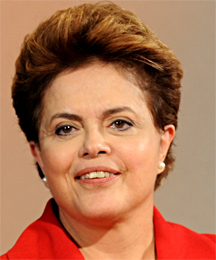BRASILIA, (Reuters) – Brazilian President Dilma Rousseff’s approval rating is at an all-time high, despite a stalled economy and political scandals that have tarnished the reputation of her ruling Workers’ Party, an opinion poll published yesterday showed.

Rousseff’s personal approval rating rose slightly to 78 percent, from 77 percent three months ago, according to the CNI/Ibope poll. Approval of her left-of-center government was unchanged at 62 percent, the poll showed.
The once-booming Brazilian economy almost ground to halt in Rousseff’s first year as president in 2011 and recovery has been disappointing this year, despite a slew of tax breaks and other incentives adopted by Rousseff’s economic team.
Third-quarter growth of 0.6 percent was half that expected by economists and surprised even the government, while investment declined for a fifth straight quarter, prompting calls from business leaders for a change in policy.
Pollsters say the slowdown has not affected most Brazilians, who continue to consume more and have a positive view of the government’s efforts to reduce interest rates to historic lows, while keeping inflation in reasonable check.
“The crisis has not reached the people yet and their view of the economy is still satisfactory, or even positive,” said CNI’s head of research, Renato da Fonseca.
“There is still good news on the economy,” Fonseca said, pointing to a popular step by Rousseff to try to lower some of the world’s highest energy costs next year.
Data published yesterday showed that the economy could be beginning to respond to Rousseff’s policies. A central bank economic-activity index rose a seasonally adjusted 0.36 percent in October after slumping in September, helped by the first annual increase in industrial output in more than a year.
But the world’s No. 6 economy is still expected to grow just 1.0 percent this year, a far cry from the 7.5-percent expansion seen in 2010.
